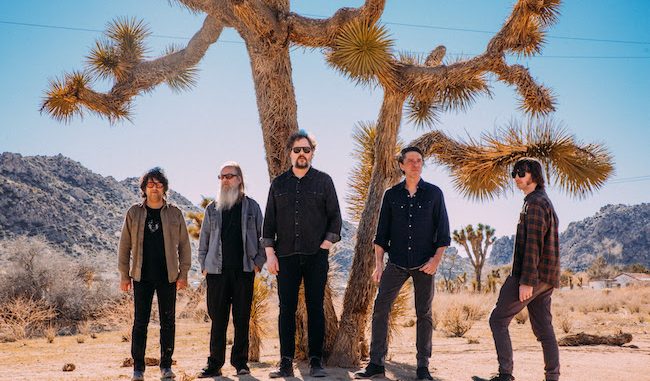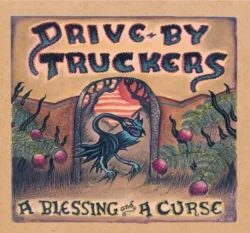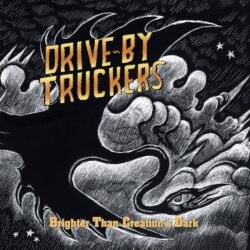
I first clapped eyes on Drive-By Truckers when they were on the Jools Holland Show in 2010 playing ‘Birthday Boy’ from “The Big to Do” album. I had always had a bit of a soft spot for southern rock and here was a group of apparently ordinary blokes playing it without looking like egomaniac-strutting rock stars. I sensed a massive enthusiasm coming from Patterson Hood and indeed there is still a clip on YouTube of them earlier in the show coming full pelt out of the blocks and playing before they should have. I was hooked – it was love at first sight.
I didn’t realise it then, but the lyrics to ‘Birthday Boy’, written by Mike Cooley, are very powerful. Cooley, a man, writes from the perspective of a female sex worker, initially stripping at somebody’s birthday “do” but at another time “Flat on your back underneath a mean old man/Just thinking happy thoughts and breathing deep”. He then deftly weaves in the idea of storms, named after women, being remembered by old men in the same way as the women of their youth. Throughout DBT’s albums, it is the words that initially grab me and make me want to listen to the songs a few times more, by which time I have grown to love the music.
They have produced 14 studio albums, starting with 1998’s “Gangstabilly” going through to 2022’s “Welcome 2 Club XIII”, 3 live albums and one compilation of “Oddities and Rarities”. I will only consider the studio albums for this article. Such is the consistent quality of their work, I have found it difficult to choose my favourite and even their weaker albums have four or five wonderful tracks.
Can’t Live With It: “A Blessing and a Curse” (2006)
 As a writer on this website I guess that it is no surprise that I like americana and my least favourite DBT albums are those that stray away from this genre. Hood has described this album as “alt-rock” influenced by their love for The Replacements, Big Star, Blue Oyster Cult and The Faces. (Ironically I like The Faces and love Big Star). A similar label might be put on another album “The Big to Do”. I find both lack the variety and different textures found in the music on many of their other albums. “Southern Rock Opera”, described by Hood as “stadium rock”, is also mainly just rock music but has excellent memorable tracks and such an original compelling narrative that it rises above these two.
As a writer on this website I guess that it is no surprise that I like americana and my least favourite DBT albums are those that stray away from this genre. Hood has described this album as “alt-rock” influenced by their love for The Replacements, Big Star, Blue Oyster Cult and The Faces. (Ironically I like The Faces and love Big Star). A similar label might be put on another album “The Big to Do”. I find both lack the variety and different textures found in the music on many of their other albums. “Southern Rock Opera”, described by Hood as “stadium rock”, is also mainly just rock music but has excellent memorable tracks and such an original compelling narrative that it rises above these two.
Hood has said that people either tell him that ABAAC is their favourite DBT album or that they hate it. I feel less passionately about it- it is a good album but with fewer memorable songs or words than other albums. There are, though, some excellent tracks starting grippingly with ‘Feb 14’, the story of the explosive end of a relationship “Flowers flying cross the room/ Vases smashed against the floor/ Said “I’d rather be alone”/Take your chocolates and go home”. In Mike Cooley’s “Gravity’s Gone” the singer is hitting absolute rock bottom. You can hear the influence of The Faces here. ‘Little Bonnie’ is a moving story of the death of a young girl in Hood’s family and its aftermath. Cooley’s ‘Space City’ is a beautiful song about an old man on his own and having regrets after the death of his wife “And I ain’t ashamed of anything my hands ever did/ But sometimes the words I used were as hard as my fist”.
The penultimate track is the title track of the album and has a crunching riff which makes it memorable. Hood says that the brilliant final track ‘A World Of Hurt’ is his second favourite of those he has written after ‘The Living Bubba’ on “Gangstabilly”. It has words which stay with you “And my good friend Paul was 83 when he told me; that “To love is to feel pain”“. Hood then goes on to say that although there will be hurt and pain in life, it is worth it for the love that you encounter. If the DBTs have a core belief, I would argue that this is it. They called one of their live albums “It’s Great To Be Alive!” after a line from this song.
There are two good tracks from Jason Isbell, ‘Easy On Yourself’ and ‘Daylight’. Both of these sound very much like his future work- they have the Isbell stamp on them. In ‘Daylight’ he sounds tormented and was at the time having problems with drug and alcohol abuse and a failing marriage to the bassist Shonna Tucker. The group was finding it very difficult to deal with his behaviour and there was also a disjoint between what he was writing and the music of Hood and Cooley. Hood says the band was “trying to find common ground at a time when it was a little hard to come by.” I wonder if the conflict in the band communicated itself in the album, which has a gloomy, downbeat feel. DBT’s albums are always dark but others are somehow more vigorous than ABAAC. In April 2007 Hood asked Isbell to take a break from the group and when he refused, Cooley told him to go. This was, therefore, Isbell’s last album with the DBTs, but he hasn’t done too badly after it, has he?
Can’t Live Without It: “Brighter Than Creation’s Dark” (2008)
 I like the DBTs the best when their music has different styles and paces and this is on show the most on the double album “Brighter Than Creation’s Dark”. It is truly an americana album with its soul, country and country-rock influences. It shows such a change in direction from “A Blessing And A Curse” even though it was their next album, recorded a couple of years after it. The opener “Two Daughters and a Beautiful Wife”, a harrowing song prompted by the senseless killing of a family, has an acoustic guitar and piano, played by the great Spooner Oldham, at the start with banjo added later. Oldham is a legendary Alabama figure who played on a number of great soul records such as “When A Man Loves A Woman”. Pedal steel, played by new member John Neff, is then introduced and this type of mix of different instruments turns up on many of the tracks here, all for the better. It gives the music more texture and interest. Neff had played on one song on ABAAC but now became a full member, playing lead guitar as well as pedal steel. Perhaps his skill on these two instruments helped to change the direction of the group- certainly, this album has much more of a country feel than any of their previous albums. One example is on the fantastic third track ‘The Righteous Path’ about a friend of Hood’s trying but struggling to make ends meet where the pedal steel really enhances the track as it does so often elsewhere. Neff also seems to have been a much more compliant figure than Isbell- Hood says that the album was recorded easily with no need for compromises.
I like the DBTs the best when their music has different styles and paces and this is on show the most on the double album “Brighter Than Creation’s Dark”. It is truly an americana album with its soul, country and country-rock influences. It shows such a change in direction from “A Blessing And A Curse” even though it was their next album, recorded a couple of years after it. The opener “Two Daughters and a Beautiful Wife”, a harrowing song prompted by the senseless killing of a family, has an acoustic guitar and piano, played by the great Spooner Oldham, at the start with banjo added later. Oldham is a legendary Alabama figure who played on a number of great soul records such as “When A Man Loves A Woman”. Pedal steel, played by new member John Neff, is then introduced and this type of mix of different instruments turns up on many of the tracks here, all for the better. It gives the music more texture and interest. Neff had played on one song on ABAAC but now became a full member, playing lead guitar as well as pedal steel. Perhaps his skill on these two instruments helped to change the direction of the group- certainly, this album has much more of a country feel than any of their previous albums. One example is on the fantastic third track ‘The Righteous Path’ about a friend of Hood’s trying but struggling to make ends meet where the pedal steel really enhances the track as it does so often elsewhere. Neff also seems to have been a much more compliant figure than Isbell- Hood says that the album was recorded easily with no need for compromises.
Highlights of the album include Cooley’s three country songs ‘Bob’, ‘Lisa’s Birthday’ and ‘Perfect Timing’. The first is a beautifully drawn portrait of a loner, the second has the singer’s partner out on the town all the time while the third has the memorably self-deprecating lines “I used to hate the fool in me, but only in the morning/now I tolerate him all day long”. His words are so skilful with a memorable turn of phrase that sticks in your mind. Cooley also provides some rock with the southern boogie of ‘Three Dimes Down’ and with ‘Self Destructive Zones’ but saves his best for the penultimate track ‘Ghost To Most’. Written after the New Orleans floods, it has a great chorus and is another example of Neff’s pedal steel working so well.
Shonna Tucker contributed three songs to the album and all work well. ‘I’m Sorry Huston’ and ‘Purgatory Line’ have a soulful feel which I like and which she brings again to some tracks on the “Go-Go Boots” album. The latter has a great vocal performance from Tucker where her yearning is clear to see. ‘Home Field Advantage’ is a catchy rocker with nice baseball metaphors in its description of a relationship.
Hood’s magnificent words catch your attention and grip you throughout the album as they always do. I can only scratch the surface of his work on the album. One example is ‘Daddy Needs a Drink’ which paints a vivid picture of a marriage: “Daddy needs a drink to hem in his demons/To hear through baby screaming or the TV set turned on” About halfway through, he then writes two brilliant songs about the Iraq War. ‘The Man I Shot’, written from the viewpoint of a soldier, brings war into crystal clarity like no other song I know: “That man I shot, I was in his homeland/I was there to help him but he didn’t want me there/I did not hate him, I still don’t hate him/He was trying to kill me and I had to take him down”. ‘The Home Front’, inspired by people in Hood’s extended family, is a heartbreaking tale of a wife left with a daughter after her husband went to Iraq. Towards the end of the album ‘Goode’s Field Road’ is a great story of a car dealer in Alabama getting involved with the wrong people with disastrous consequences. The version on the live CD “It‘s Great To Be Alive” is even better.
Choosing this was a close call. I really like the rough-edged alt-country of their debut “Gangstabilly”. “Decoration Day” has many great songs on it as has “English Oceans”. “The Dirty South” has a brooding menace that draws you to it- you get such a strong feeling of the dark side of southern life from the album as a whole. I nearly chose it. I was much more taken by the country-soul and tales of murder and torment on “Go-Go Boots” than many, apparently. In latter times, the more political “American Band” was rightly praised as one of the best albums that year. But I also loved its follow-up “The Unraveling” which had some passionate and stirring political songs alongside some other fabulous tracks.
It is a marvel how they keep producing all these high-quality songs. It really whets your appetite for their next offering.


